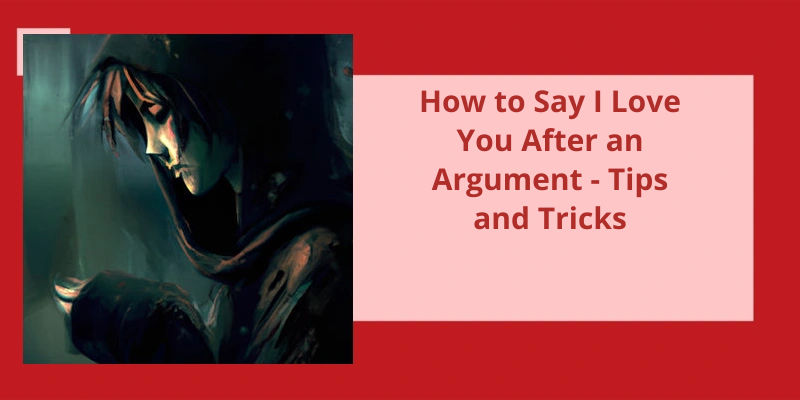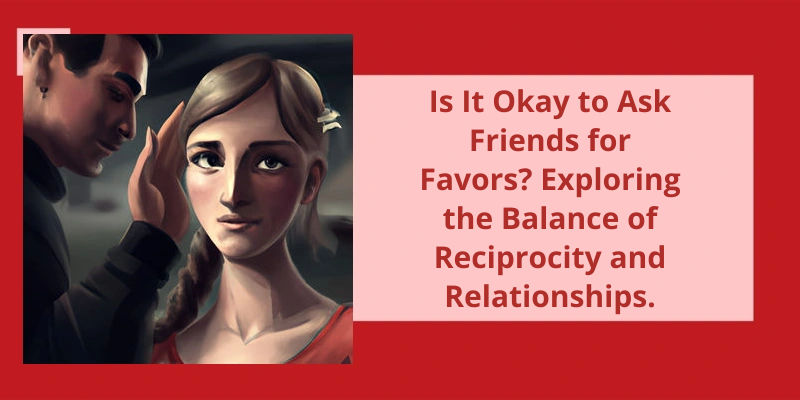Carla Marie Manly, a clinical psychologist and author. It can be difficult to express love and affection after a heated argument because both parties may still be feeling hurt, angry or defensive. However, taking the time to approach your partner with genuine love and a willingness to work together can help heal the wounds caused by the argument. Whether it's through a heartfelt conversation or a simple gesture, finding a way to say "I love you" can bring you closer together and strengthen your relationship. In this article, we'll explore some ways to express love and affection after an argument.
How Do You Say I Love You After a Fight?
After a fight with your significant other, it can be difficult to find the right way to express your feelings and make amends. However, it’s important to take the time to communicate your love and commitment to your partner after the disagreement has ended. Saying “I love you” can be a powerful way to bridge the gap and reconnect emotionally.
When saying “I love you” after a fight, it’s important to choose your words carefully. Simply saying the words without acknowledging the cause of the argument or making an effort to resolve the conflicts won’t be enough to heal the emotional wounds. Take the time to genuinely apologize for anything hurtful you may have said and be willing to make compromises in order to move forward.
It’s also important to recognize that expressing your love doesn’t always have to be as straightforward as saying the words aloud. Sometimes, actions speak louder than words, and taking the time to show your partner that you care can be just as meaningful. Consider small gestures like making their favorite meal or buying them a thoughtful gift as a way to show your love and affection.
Another helpful approach to communicating after a fight is to focus on future goals and aspirations as a couple. By reminding your partner of your shared vision for the future, you can demonstrate your commitment to the relationship and inspire a renewed sense of hope and optimism.
How to Effectively Communicate During a Fight to Prevent Love Being Hurtful Things Said
The key to preventing hurtful things being said during a fight is to communicate effectively. This means taking a pause before speaking, actively listening to the other person, and expressing your feelings in a respectful and constructive manner. It’s important to focus on finding a resolution rather than just winning the argument. Remember that love should never be used as a tool to hurt another person, even during a heated argument.
Communication is key in any relationship, and sometimes arguments are bound to happen. However, it’s important to learn how to end an argument with love and respect for each other. Here are some helpful tips on what to say to your partner over text to help you both move past the conflict.
How Do You End an Argument With Love?
Arguments happen in any relationship, and it’s important to find a healthy and constructive way to end them. One of the best ways to end an argument with love is to validate your partners feelings while also expressing your own. Saying “I agree with what you said but I needed to say my side too” is a great way to show that you’re listening and understand their perspective, but also have your own thoughts and feelings to express.
Another powerful statement to say to your partner during an argument is a declaration of love. Saying “First things first, I love you” can help to diffuse tension and remind both of you that your love for each other is more important than any disagreement you may have. It can also serve as a reminder that you’re both on the same team, working towards a resolution to the conflict.
Sometimes it can be helpful to step back and recognize when an argument has become a pattern. Saying something like “It’s a pattern, we just keep throwing things into the argument” can help to break that pattern and refocus the conversation towards finding a resolution. It can also help to take some responsibility for your part in the argument, which can help to defuse things and move forward.
When tempers flare, it can be easy to say things that we regret later. If you realize that you’ve said something hurtful or wrong, it’s important to take ownership of that and apologize. Saying “I shouldnt have lost my temper last night” shows your partner that you recognize your actions and are willing to take responsibility for them. It can also open the door to a deeper conversation about how you can both work together to communicate more effectively in the future.
In any argument, it’s important to remember that your partners feelings are valid, even if you don’t agree with their perspective. Saying something as simple as “I hear how youre feeling” can go a long way towards validating their experience and creating space for a productive conversation. It can also help to show your partner that you’re willing to listen and work together towards finding a resolution.
Ultimately, the key to ending an argument with love is to approach the situation with empathy and compassion. Showing your partner that you understand their perspective while also expressing your own feelings in a respectful way can help defuse the situation and lead to a productive conversation. By keeping the lines of communication open and working together towards a resolution, you can strengthen your relationship and build a foundation of trust and understanding.
It’s undeniable that expressing love towards someone can be intimidating, especially when emotions are high. However, there are deeper psychological reasons why some people struggle to verbalize these feelings, even when they aren’t actually experiencing anger or frustration. In this article, we will delve into some of the most common reasons that make it hard to say “I love you”.
Why Is It Hard to Say I Love You When You Are Mad?
Moreover, when emotions run high – particularly anger, challenging emotions can make it difficult to express positive emotions. The tension created by feelings of anger, frustration, and disappointment can make a person more likely to hold back their feelings of fondness or love for fear of the other person not feeling the same or even reacting negatively.
Another reason people have difficulty expressing love while mad is due to the complexity of the emotions involved. Anger and love are two contrasting emotions, and the complexity of dealing with both at the same time can be overwhelming. While anger can make a person feel out of control and create a desire to lash out, love is often associated with feelings of restraint and control. Sometimes it’s difficult to overcome the emotional struggle that arises when trying to express both at the same time.
Saying “I love you” also provides a psychological enforcement that a person has a serious desire to be with you. Individuals who’ve trust and abandonment issues may find it difficult to say “I love you” because they perceive it as an irrevocable commitment that they may not be ready to make. They may be afraid of losing control of the relationship or of being rejected, which makes it hard for them to express their love.
In addition to this, saying “I love you” can be risky. It can’t be unsaid, which makes it hard to take back once it’s been spoken. This fear can make it challenging to express such intimate feelings, so people prefer to deflect or avoid the subject when angry over something. The worry that the love communicated can be exploited or used as leverage in the fight can make a person vulnerable, and vulnerability isn’t something people are willing to offer when their guard is up.
The last reason people might have trouble saying “I love you” when mad is due to the fear of how it may affect their partner. Intense anger can make us less willing to put ourselves out there and show affection, even if we believe it’s genuinely felt. As a result, it can be easier to hold back from expressing love to avoid making our partner feel guilty or making the situation more volatile. People are scared to let their partner know how much they mean to them when they could lose their composure and stir up even more emotions.
How to Communicate Love Effectively During Moments of Anger.
- Show empathy and understanding towards your partner’s feelings.
- Use “I” statements instead of “you” statements to express your own emotions.
- Avoid blaming or accusing your partner in the heat of the moment.
- Show love through physical touch, such as holding hands or giving a hug.
- Listen actively to your partner’s perspective without interrupting or dismissing their feelings.
- Express gratitude and appreciation for your partner, even during moments of conflict.
- Take breaks to cool down and process your emotions before continuing the conversation.
- Compromise and find a solution that satisfies both partners’ needs and desires.
- Remember that communication is an ongoing process and requires effort and practice.
Source: Why Do Some People Find It Hard to Say “I Love You”?
Communication in a relationship can be tricky, especially during arguments. While it’s common to express love and affection towards your partner, it’s important to recognize the intentions behind these words. Saying “I Love You” after an argument may not always be genuine, and in some cases, it may be a manipulative tactic. This brings up an important question: Is saying “I Love You” after an argument manipulative? Let’s take a closer look.
Is Saying I Love You After an Argument Manipulative?
When arguing with a partner or loved one, the phrase “I Love You” can be used to put them in a position that’s difficult to argue against. This phrase can make the other person feel guilty for arguing in the first place and can give the one using this tactic a sense of power. Manipulative people use this tactic consciously or unconsciously, creating an emotional leverage that the other person feels in their relationship.
After making a mistake, especially one that’s caused an argument, saying “I Love You” can be a great way to appease the other party and doge responsibility for the mistake. Apologizing is one thing, but adding the phrase “I Love You” to the end of the apology can start to blur the lines between an apology and manipulation. This can be particularly harmful if it’s repeated frequently in the relationship, as it can undermine the other persons trust in the relationship.
Another way that “I Love You” can be used as a manipulation tactic is to keep someone around in the relationship, even if it’s not in their best interest. For example, if one partner wants to break up, the other partner may say “I Love You” constantly in an attempt to sway their partner into staying in the relationship. This can be dangerous and harmful, as it can cause one partner to feel trapped in the relationship and unable to escape.
Whether it’s conscious or unconscious, using this phrase in an attempt to control or manipulate someone else isn’t healthy for the relationship and can ultimately be damaging to both parties involved.
How to Respond to “I Love You” After an Argument: Is It Genuine or Manipulative?
In this scenario, it’s important to analyze whether the “I love you” statement is genuine or manipulative. Take time to reflect on the context of the argument and the behavior of the person expressing their love. Responding with honesty and setting boundaries can help avoid being manipulated.
Expressing love to someone you hurt can be a challenging task, but a necessary one to mend the relationship. It requires not only admitting your mistake but also taking the steps to make things right and provide reassurance to the person you hurt. It involves validating their feelings and truly understanding the pain they’re going through. By hearing them out, you can show that you still care and are willing to work on the relationship.
How Do You Express Love to Someone You Hurt?
I’m here to listen.”. Apologizing: “I’m sorry for the pain I caused you.”. Taking responsibility: “I understand that I hurt you and it was my fault.”. Making amends: “What can I do to make it right?”. Committing to change: “I want to work on being a better partner to you.”
Expressing love to someone you’ve hurt can be a challenging task. Hurt is a powerful emotion, and it can take time to heal. When someone feels hurt and betrayed, they may feel unloved and unworthy. However, providing reassurance can be a great way to express your love. Telling your partner that you love them and are here for them can help them feel valued and appreciated.
Validating your partners pain is also crucial. Acknowledging their hurt and understanding why it affected them so deeply is a powerful expression of love. When someone feels heard and seen, they’re more likely to feel loved and appreciated. It’s essential to take the time to understand your partners emotions and experiences fully.
Apologizing and taking responsibility for your actions is another vital aspect of expressing love to someone you’ve hurt. When you hurt someone, it’s essential to acknowledge the pain you caused and take steps to make it right. Making amends, committing to change, and doing your best to prevent the same mistake from happening again are all critical steps towards healing and rebuilding trust.
However, it’s important to remember that healing takes time and patience. There may be moments when they struggle, and it’s your job to be supportive, patient, and understanding during those times. Loving someone means being there for them, even when it’s challenging or uncomfortable.
It’s essential to provide reassurance, validate their pain, understand their emotions, apologize, take responsibility and commit to change. Remember, love requires effort, and it’s worth it in the end.
Conclusion
This simple phrase can go a long way in repairing any damage done during the argument and can serve as a reminder to both parties that love and communication are essential components of a healthy relationship. It's important to remember that conflicts are bound to happen in any relationship, but how they’re handled can determine the strength and longevity of the bond. Saying "I love you" after an argument not only expresses affection but also shows a willingness to work through issues and move forward together. So, take the time to express your love and appreciation for your partner, even in the midst of disagreement, and watch as it transforms your relationship.






